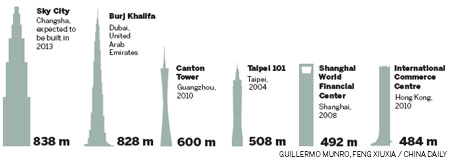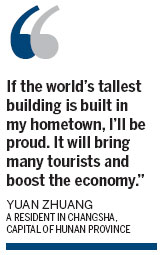

Sky City falls short in safety features: critics
Urban planners have slammed proposals to build the world's tallest skyscraper in China, saying it would be a death trap in emergencies.
Sky City, if built, will be 220 stories tall and stand more than 838 meters, higher than the 828-meter-tall Burj Khalifa in Dubai, the world's tallest building.
Property developer Broad Group paid 390 million yuan ($62.6 million) this month for about 67,300 square meters of land in Changsha, capital of Hunan province.

According to the company's website, the tower will house 4,000 families in apartments between the 16th and 180th floor, and has offices, a hotel, a school, a hospital, shops and stores, a gym and restaurants.
But architects claim the residents would be vulnerable if fires broke out.
"With so many people living and working in the building, there will be risks everywhere," said Li Xun, vice-president of the China Academy of Urban Planning and Design. "What if there is a fire, or an elderly man has a heart attack?"
Generally, ladders used by fire rescue crews can reach a maximum height of 100 meters.
Wang Youwei, vice-president of the China Academy of Building Research, also estimated that an elevator in the skyscraper would take some time to travel from the ground to the top floor.
"These minutes could be crucial in some situations," he said. "A sick person might die."
On Monday, Broad Group spokesman Zhu Linfang declined to comment on the criticism that has been aimed at the project.
"The design team is professional and has taken all safety factors into consideration," she said, adding only that the company had "bought the land, handed our plans to the authorities and are waiting for the result of an assessment".
However, an official in Changsha's urban-rural planning bureau said his office had received no paperwork from Broad Group.
Information posted on the company's website said the tower will be built in nine months. Zhou Xiangjiang, who is responsible for Broad Group's building technology, told China Daily in July that the building can be built in such a short period of time because some parts will be prefabricated and assembled onsite.
Critics also raised concerns over long-term dangers, such as subsidence.
"I'm not familiar with the geological features of Changsha, but such a huge building may cause serious problems, even a disaster," Wang said.
A report by the China Geological Survey released this year found that a growing number of skyscrapers are contributing to subsidence in some areas.
Research shows the most vulnerable spots are in the North China Plain, the Yangtze River Delta and the Fenwei Basin, covering a combined area of 79,000 square km - more than 100 times the size of Singapore.
A two-story building sank in Quanhong village in Changsha on Nov 19, Chinanews.com reported.
However, city resident Yuan Zhuang said he is not worried about the potential risks.
"If the world's tallest building is built in my hometown, I'll be proud. It will bring many tourists and boost the economy,"he said.
He added that earthquakes seldom hit Changsha, "which means there's nothing to worry about".
In September, a report by the Council on Tall Buildings and Urban Habitat, an international organization based in the United States, stated that China is planning or building more skyscrapers than any other country, with 239 buildings to be at least 200 meters tall under construction.
Contact the writers at wangqian@chinadaily.com.cn and fengzhiwei@chinadaily.com.cn
